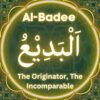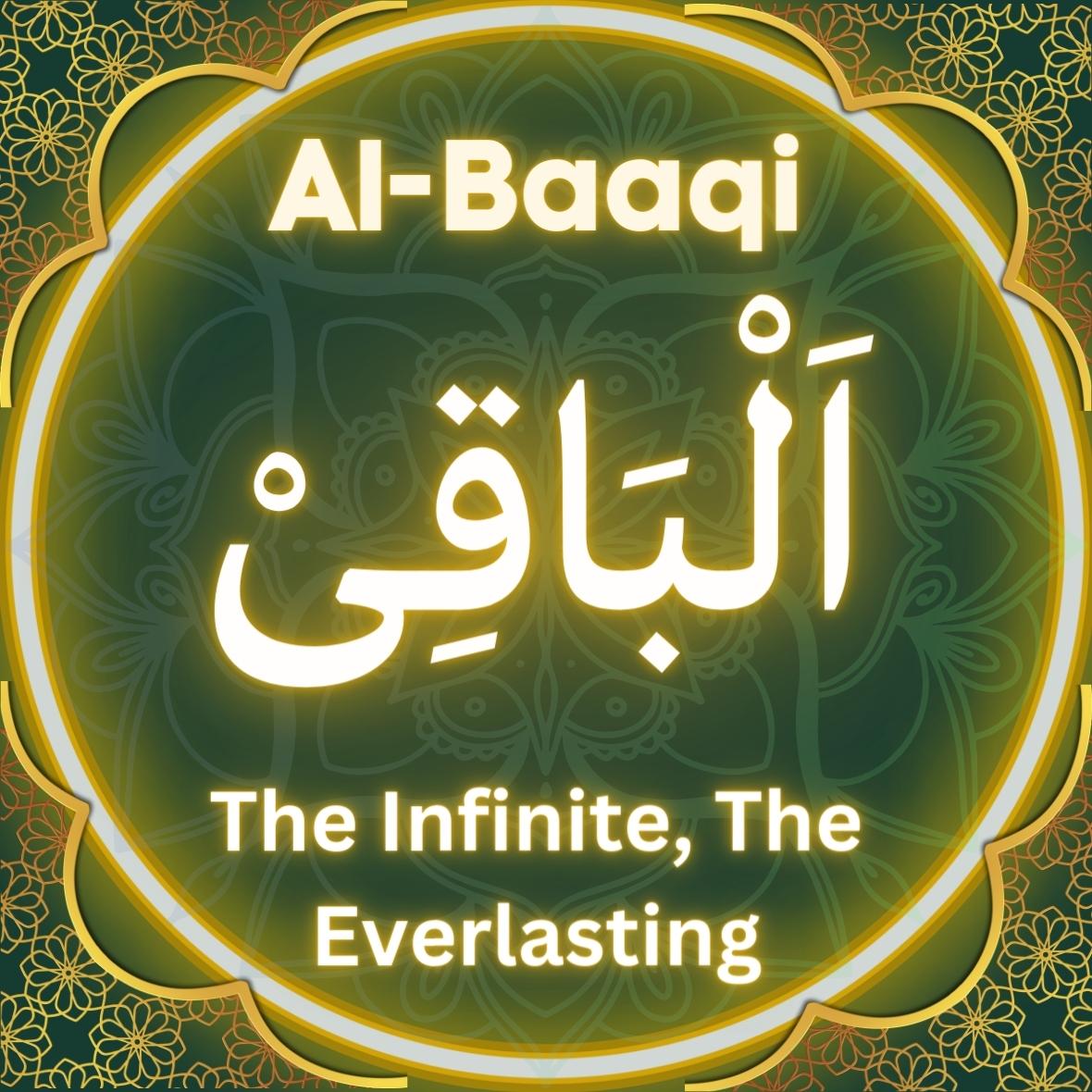Al-Baaqi (ٱلْبَاقِي): The Everlasting, The Infinite
Introduction
The Asma’ul Husna (The Beautiful Names of Allah) are among the greatest treasures of Islamic spirituality and theology. These Names reflect the divine attributes of perfection, mercy, power, and majesty. Allah ﷻ tells us:
“And to Allah belong the Most Beautiful Names, so call upon Him by them.” (Qur’an 7:180)
Each of the 99 Names provides unique insight into who Allah is and how believers can draw closer to Him. The Prophet ﷺ said:
“Indeed, Allah has ninety-nine Names; whoever preserves them (believes in them, memorizes them, acts upon them) will enter Paradise.” (Ṣaḥīḥ al-Bukhārī, Ṣaḥīḥ Muslim)
Among these is Al-Baaqi (ٱلْبَاقِي), The Everlasting, The Infinite. It highlights the eternal nature of Allah, contrasting with the fleeting existence of creation. In a world where everything changes and decays, the Name Al-Baaqi reassures us that only Allah remains forever, unchanged and eternal.
The Meaning of the Name
-
Literal Meaning: Al-Baaqi means “The One Who remains, The Everlasting.”
-
Metaphorical Meaning: He whose existence is eternal, whose being does not perish, and whose attributes never fade.
Thus, Al-Baaqi is the Eternal Reality — while all else perishes, He remains.
Linguistic and Theological Analysis
Root and Structure
-
Derived from the root: ب ق ي (ba-qā-ya) → meaning to remain, to endure, to last.
-
Al-Baaqi is in the intensive form, meaning The One who alone remains forever.
Qur’anic Usage
The Name “Al-Baaqi” itself does not appear explicitly in the Qur’an, but it is derived from verses emphasizing Allah’s everlasting nature:
﴿ وَيَبْقَىٰ وَجْهُ رَبِّكَ ذُو الْجَلَالِ وَالْإِكْرَامِ ﴾
“But the Face of your Lord, full of Majesty and Honor, will remain forever.” (Qur’an 55:27)
Tafsir & Scholarly Commentary
-
Ibn Kathir explains this verse: “Everything will perish except Allah. He will remain forever, the Owner of Majesty and Honor.”
-
Imam al-Ghazali (رحمه الله) in al-Maqsad al-Asna notes: “Al-Baaqi is the One whose existence has no end, while all else vanishes. His permanence is not bound by time.”
Significance in Islamic Thought
The Name Al-Baaqi is central to Islamic theology (ʿaqīdah):
-
Affirmation of Tawḥīd – Only Allah is eternal, everything else depends on Him.
-
Reminder of Dunya’s Fragility – The world and its possessions are temporary.
-
Focus on the Ākhirah – Eternal life is with Allah, not in worldly attachments.
-
Sufi Thought – Scholars describe fanāʾ (annihilation of the self) followed by baqāʾ (enduring in Allah) as the peak of spiritual realization.
Spiritual and Practical Lessons
From Al-Baaqi, we gain five key spiritual lessons:
-
Detachment from Dunya – Nothing lasts except Allah; don’t cling to the temporary.
-
Patience in Trials – Hardships end, but Allah’s reward remains.
-
Comfort in Loss – People and things fade, but Allah never leaves.
-
True Priorities – Focus on deeds that remain (ṣadaqah jāriyah, knowledge, children’s duʿāʾ).
-
Inner Stability – When anchored in Al-Baaqi, the believer finds unshakable peace.
Practical Implementation of Al-Baaqi
Muslims can live by this Name through:
-
Dhikr – Repeating “Yā Baaqi” to remember Allah’s eternal nature.
-
Supplication – Praying: “Yā Baaqi, grant me everlasting mercy and eternal success.”
-
Charity & Legacy – Investing in good deeds that remain after death.
-
Perspective Shift – Seeing worldly gains as fleeting, and prioritizing eternal rewards.
-
Patience & Gratitude – Recognizing that both blessings and trials are temporary.
Direct Qur’anic References for Al-Baaqi
Surah Ar-Rahman (55:26–27)
Arabic:
كُلُّ مَنْ عَلَيْهَا فَانٍ • وَيَبْقَىٰ وَجْهُ رَبِّكَ ذُو الْجَلَالِ وَالْإِكْرَامِ
Translation:
“Everyone upon the earth will perish, and there will remain the Face of your Lord, Owner of Majesty and Honor.”
Tafsir:
Ibn Kathir explains that these verses emphasize the mortality of all creation. Everything will come to an end — humans, jinn, and the universe itself — yet Allah alone will remain forever. His existence is not dependent on time or creation. The “Face of your Lord” here symbolizes Allah Himself, exalted in Majesty and Honor.
Surah Al-Qasas (28:88)
Arabic:
كُلُّ شَيْءٍ هَالِكٌ إِلَّا وَجْهَهُۥ ۚ لَهُ ٱلۡحُكۡمُ وَإِلَيۡهِ تُرۡجَعُونَ
Translation:
“Everything will perish except His Face. His is the decision, and to Him you will all be returned.”
Tafsir:
According to classical exegesis, this verse reinforces that nothing endures except Allah. All power, authority, and judgment belong to Him alone. The return of all beings to Him on the Day of Judgment highlights His permanence and sovereignty.
Related Qur’anic Verses
Surah Al-Hadid (57:3)
Arabic:
هُوَ ٱلۡأَوَّلُ وَٱلۡآخِرُ وَٱلظَّاهِرُ وَٱلۡبَاطِنُۖ وَهُوَ بِكُلِّ شَيۡءٍ عَلِيمٞ
Translation:
“He is the First and the Last, the Ascendant and the Intimate, and He is, of all things, Knowing.”
Tafsir:
This verse establishes Allah as timeless — the One before whom there was nothing (Al-Awwal), and the One after whom nothing remains (Al-Akhir). His everlastingness is absolute, unlike creation which is bound by beginning and end.
Surah Al-Ikhlas (112:2)
Arabic:
ٱللَّهُ ٱلصَّمَدُ
Translation:
“Allah, the Eternal Refuge.”
Tafsir:
Ibn Kathir interprets As-Samad as the One who is everlasting, perfect, and free of need. Everything depends on Him, yet He remains eternally self-sufficient. This verse complements the meaning of Al-Baaqi, highlighting Allah’s permanence and independence.
FAQs
Q1: What does Al-Baaqi mean in Islam?
It means The Everlasting, The Infinite – the One who remains forever while creation perishes.
Q2: How can Muslims invoke Al-Baaqi in duʿāʾ?
By saying: “Yā Baaqi, grant me stability in faith and everlasting mercy.”
Q3: How does belief in Al-Baaqi impact spiritual life?
It brings detachment from dunya, focus on akhira, and peace in trials.
Q4: Is Al-Baaqi mentioned in the Qur’an by name?
Not directly, but its meaning appears in verses like Qur’an 55:27 and 28:88.
Q5: Which Names of Allah are related to Al-Baaqi?
Al-Awwal (The First), Al-Akhir (The Last), and As-Samad (The Eternal Refuge).



